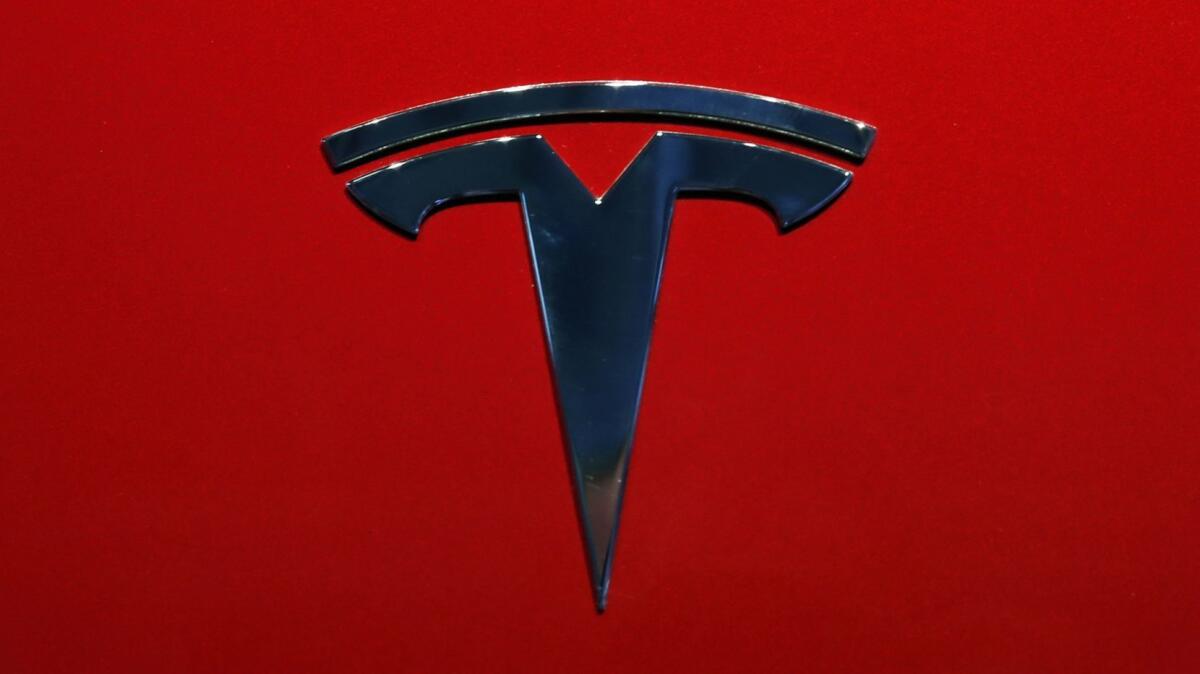Tesla just delivered its first China-built cars in Shanghai

- Share via
Tesla Inc. is about to find out whether the second time is the charm for Elon Musk making bold predictions about how many cars the company can build and sell.
The electric-car maker handed over the first 15 Model 3 sedans assembled at its new multibillion-dollar plant near Shanghai — its first factory outside the United States — to employees at the facility Monday. Tesla took the same approach when it started production of the sedan in California in July 2017, delivering its first Model 3s to staff members.
After reaching that milestone more than two years ago, Tesla went through months of what Musk called production hell. After consistently falling well short of the chief executive’s ambitious targets, Tesla burned through billions of dollars and came within weeks of running out of money.
Investors have been betting this time will be different, with Tesla shares on a tear since the company reported a surprise quarterly profit in late October. The carmaker is on much steadier footing, having worked out the kinks that limited initial production of the Model 3 and managing to far outpace sales of many other automakers’ electric vehicles. The China plant is already assembling more than 1,000 cars a week and aims to double that rate over the next year, according to Song Gang, the facility’s manufacturing director.
Despite all the progress made, there are still doubters. Jeffrey Osborne, an analyst at Cowen & Co., predicted Monday that Tesla will fall short of the low end of its delivery forecast for this year. He predicts the company will hand over about 101,000 vehicles in the fourth quarter, coming roughly 4,000 units short of its annual target of at least 360,000.
Tesla shares slid 3.6% Monday. The stock is still up more than 62% since the company reported third-quarter earnings Oct. 23.
Osborne, who rates Tesla the equivalent of a sell, is skeptical that demand for the Model 3 will continue at current rates. He’s concerned consumers will be less interested in the car as subsidies drop in China and the Netherlands and as a federal tax credit expires in the United States.
“The large amount of over exuberance related to the demand for Tesla’s products in the mid to long term has increased over the past few months, and we believe much more successful penetration is baked into the stock than is likely to play out,” Osborne wrote in a report. “While Tesla has built a very dedicated fanbase that has been willing to excuse poor build quality, customer service, and service infrastructure, we continue to be skeptical around broader adoption.”
Tesla’s stock decline starkly contrasts the jubilant mood at the company’s ceremony to mark the first deliveries of Model 3s assembled near Shanghai.
A crowd of about 200 people, including media members and employees, gathered inside the plant to clap and cheer as Tom Zhu, Tesla’s head of the greater China unit, handed over the first cars. One employee receiving a car presented it to his girlfriend along with flowers and proposed to her. She accepted with a nod, and they kissed. More workers will receive vehicles over the next couple of days, and deliveries to customers will start in January, company officials said.
The Chinese plant represents a cornerstone of Musk’s plans to make Tesla a truly global carmaker. Last month the company announced plans to build a factory in Germany to cater to burgeoning European demand for electric vehicles.
The China plant could also help Musk build on recent momentum for the company in the world’s largest market both for electric vehicles and autos in general. The Model 3 will compete with electric offerings from local manufacturers including NIO Inc. and Xpeng Motors, as well as global companies such as BMW and Daimler.
Demand for the China-built Model 3 is “very good,” and Tesla is confident it will sell all vehicles manufactured at the site, Allan Wang, general manager of Tesla China, said at the plant. “Our aim is to kill all internal-combustion engine cars.”
Although deliveries to customers haven’t started, Monday’s milestone caps several months of wins for Musk. The latest came Friday, when the locally built car was included on a list of vehicles qualifying for an exemption from a 10% purchase tax in China.
Tesla said in October the locally built Model 3 will be priced from about $50,000. On top of the tax exemption announced Friday, the China-built model this month qualified for a government subsidy of as much as about $3,600 per vehicle.
Tesla’s original car factory — and, for years, its only one — in Fremont, Calif., spent months trying to hit a 1,000 weekly rate. Musk has said a weekly production rate of 3,000 at the China plant is a target at some point.
The China factory broke ground at the start of this year. Originally just a muddy plot about a 90-minute drive from Shanghai’s city center, it is now a crucial test of Musk’s bid to prove Tesla can be consistently profitable.
As part of its China expansion, Tesla plans to add dozens of locations in the country over the next year for showcasing its vehicles and providing charging and other services, Xue Juncheng, director of China aftersales, said at the ceremony.
The company may lower the price of the sedans made in China by 20% or more next year as it starts using more local components and reduces costs, people familiar with the matter have said.
About 30% of the parts used by the Shanghai facility are sourced locally, and the company plans to increase that to 100% by the end of 2020, said Song, the manufacturing director.






